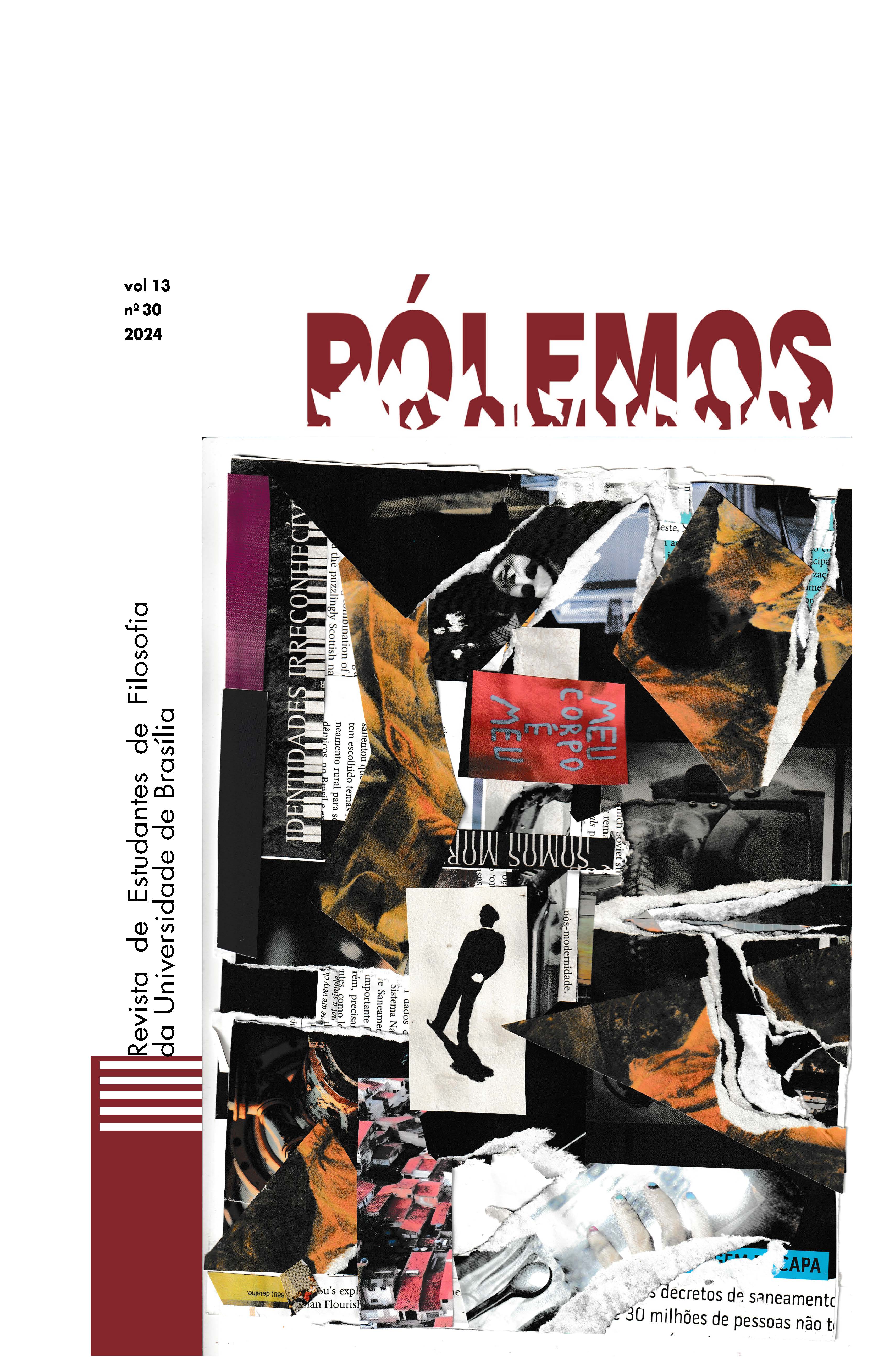"NÃO SOU UM ROBÔ"
o que os teste de linguagem nos permitem dizer sobre isso?
DOI:
https://doi.org/10.26512/pl.v13i30.55518Palavras-chave:
Testes de Linguagem, Inteligência artificial, Natureza humana, René Descartes, Alan TuringResumo
Neste artigo, argumentamos que um Teste de Linguagem não é suficiente para o reconhecimento da inteligência como uma propriedade intrínseca tanto de máquinas como de seres humanos. Explicamos que defender o contrário decorre de uma noção cartesiana de "natureza humana", que leva à confusão entre as interpretações ontológica e epistêmica desses testes: não se segue do fato que "eu sei o que sou" que "eu sei que algo é ou não é como eu". Assim, qualquer Teste de Linguagem que vise a identificação de algum marco ontológico da humanidade (racionalidade, pensamento, intencionalidade) apresenta esse mesmo problema, que, em última instância, leva ao solipsismo e ao Problema das Outras Mentes. A fim de evitar esse desfecho, temos de admitir a possibilidade de existência da Inteligência Artificial no sentido forte ou assumir que, contraintuitivamente, talvez não saibamos com máxima clareza e distinção se somos humanos ou máquinas.
Downloads
Referências
ARISTÓTELES. Política. Tradução e notas de Antonio de Castro Caeiro. Edição bilíngue. São Paulo: Martins Fontes, 2001.
AVRAMIDES, A. The sceptic, the outsider, and other minds. Topoi, Springer Verlag, v. 42, n. 1, p. 175–186, 2023. DOI: https://doi.org/10.1007/s11245-022-09827-9.
AYGÜN, Ömer. Human logos in Aristotle. In: KIRKLAND, Sean D.; SANDAY, Eric (orgs.). A companion to ancient philosophy. Evanston, Illinois: Northwestern University Press, 2018. (Rereading ancient philosophy), pp. 177-191.
BRENTANO, F. Psychology from an Empirical Standpoint. London: Taylor & Francis Ltd – Routledge, 2014. Originally published in 1874.
BRINGSJORD, S.; GOVINDARAJULU, N. S. Artificial Intelligence. In: ZALTA, E. N.; NODELMAN, U. (Ed.). The Stanford Encyclopedia of Philosophy. Summer 2024. [S.l.]: Metaphysics Research Lab, Stanford University, 2024.
COPELAND, J. The Turing test. Minds and Machines, v. 10, n. 4, p. 519-539, 2000. DOI: https://doi.org/10.1023/A:1011285919106.
CRANE, Tim. Contemporary issues in the philosophy of mind. Cambridge: Cambridge University Press, 1998.
DESCARTES, René. Os Pensadores: Discurso do método; Meditações; Objeções e respostas; As Paixões da Alma; Cartas. Tradução de J. Guinsburg e Bento Prado Júnior. São Paulo: Abril Cultural, 1973.
HÜLSZ, Enrique. Heraclitus on logos: language, rationality and the real. In: SIDER, David; OBBINK, Dirk (ed.). Doctrine and doxography: studies on Heraclitus and Pythagoras. Berlin; Boston: De Gruyter, 2013, pp. 281-302.
HUSSERL, E. Ideias para uma Fenomenologia Pura e uma Filosofia Fenomenológica: Introdução Geral à Fenomenologia Pura. Revista e ampliada. São Paulo: Ideias & Letras, 2006.
HUSSEY, Edward. Epistemology and meaning in Heraclitus. In: SCHOFIELD, Malcolm; NUSSBAUM, Martha Craven (ed.). Language and logos: studies in ancient Greek philosophy presented to G. E. L. Owen. Cambridge: Cambridge University Press, 1982, pp. 33-61.
JEFFERSON, G. The mind of mechanical man. Lister Oration for 1949. British Medical Journal, v. 1, n. 4616, p. 1105-1121, 1949. Disponível em: http://www.jstor.org/stable/25372573. Acesso em: 07 jan. 2025.
JOHNSTONE, Mark A. On ‘Logos’ in Heraclitus. In: INWOOD, Brad (ed.). Oxford studies in ancient philosophy. V. 47. Oxford: Oxford Academic, 2014, pp. 1-29. Online edn, 17 nov. 2016. DOI: https://doi.org/10.1093/acprof:oso/9780198722717.003.0001.
MOOR, James H. The status and future of the Turing test. Minds and Machines, v. 11, n. 1, p. 77-93, fev. 2001. DOI: https://doi.org/10.1023/A:1011218925467.
PERNU, Tuomas K. The five marks of the mental. Frontiers in Psychology, v. 8, 07 jul. 2017. DOI: https://doi.org/10.3389/fpsyg.2017.01084.
PICCININI, Gualtiero. Turing's rules for the imitation game. Minds and Machines, v. 10, p. 573-582, nov. 2000. DOI: https://doi.org/10.1023/A:1011246220923.
PLATÃO. Teeteto e Crátilo. Tradução de Carlos Alberto Nunes. Belém: Universidade Federal do Pará, 1988.
RUSSELL, S. J.; NORVIG, P. Artificial intelligence: a modern approach. Malaysia: Pearson Education Limited, 2016.
SARTRE, Jean-Paul. The psychology of the imagination. London: Routledge, 1995. Originalmente publicado em 1940.
SCHANK, R. C.; ABELSON, R. P. Scripts, Plans, Goals, and Understanding. Hillsdale, N.J.: Lawrence Erlbaum Press, 1977.
SEARLE, J. R. Minds, brains, and programs. Behavioral and Brain Sciences, v. 3, n. 3, p. 417–424, 1980. DOI: https://doi.org/10.1017/S0140525X00005756.
SEARLE, J. R. Reductionism and the irreducibility of consciousness. In: FLANAGAN, O. J.; BLOCK, N.; GUZELDERE, G. (ed.). The Nature of Consciousness. [S.l.]: MIT Press, 1997, pp. 69-80.
SEARLE, J. R. Dualism revisited. Journal of Physiology, v. 101, n. 4-6, p. 169–178, 2007.
SEARLE, J. R. Intencionalidade. São Paulo: Editora Martins Fontes, 2002.
TROTT, Adriel M. Logos and the political nature of anthrôpos in Aristotle’s Politics. Polis, v. 27, n. 2, p. 292-307, 2010. Disponível em: https://ssrn.com/abstract=3369901. Acesso em: 07 jan. 2025.
TURING, A. M. Computing machinery and intelligence. Mind, New Series, v. 59, n. 236, p. 433–460, 1950. DOI: https://doi.org/10.1093/mind/LIX.236.433.
WEIZENBAUM, J. Eliza - a computer program for the study of natural language communication between man and machine. Communications of the Association for Computing Machinery, v. 9, p. 36–45, 1966. DOI: https://doi.org/10.1145/365153.365168.
WEST, Martin L. Early Greek philosophy and the Orient. Oxford: Clarendon Press, 1971.
WINOGRAD, T. A procedural model of language understanding. In: SCHANK, R.; COLBY, K. (Ed.). Computer Models of Thought and Language. San Francisco: W. H. Freeman, 1973, pp. 152-186.
Downloads
Publicado
Como Citar
Edição
Seção
Licença
Copyright (c) 2025 PÓLEMOS – Revista de Estudantes de Filosofia da Universidade de Brasília

Este trabalho está licenciado sob uma licença Creative Commons Attribution-NonCommercial-NoDerivatives 4.0 International License.
Todos os trabalhos que forem aceitos para publicação, após o devido processo avaliativo, serão publicados sob uma licença Creative Commons, na modalidade Attribution-NonCommercial-NoDerivatives 4.0 International Public License (CC BY-NC-ND 4.0). Esta licença permite que qualquer pessoa copie e distribua a obra total e derivadas criadas a partir dela, desde que seja dado crédito (atribuição) ao autor / Ã autora / aos autores / às autoras.


